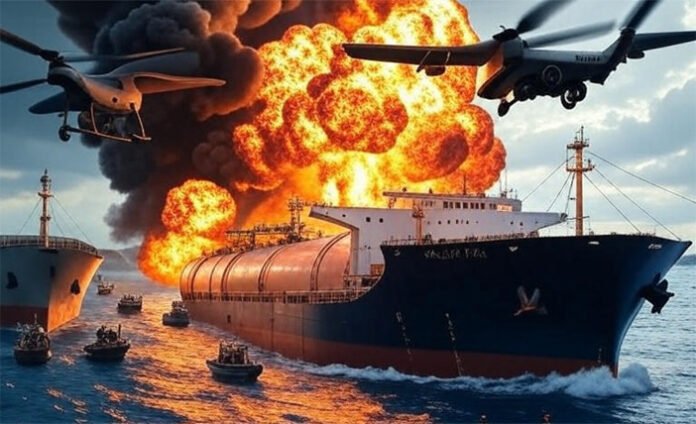Islamabad/Jerusalem, Sept 29, 2025 — Regional tensions escalated this week after a Pakistani-crewed LPG tanker was struck by an Israeli drone while docked at the Houthi-controlled Ras al-Isa Port in Yemen. The attack, which occurred on September 17, triggered a massive explosion onboard and left the 27-member crew trapped in a volatile hostage crisis.
According to Pakistan’s Interior Minister Mohsin Naqvi, the vessel narrowly avoided catastrophe as the crew managed to bring the raging fire under control. “Despite the explosion in the LPG tanks, our crew acted with immense bravery to prevent a deadly tragedy,” Naqvi said in a statement on X (formerly Twitter).
The tanker was carrying 24 Pakistanis, two Sri Lankans, and one Nepali. No fatalities were reported.
Houthis Seize the Vessel
Minutes after the strike, Houthi rebel boats surrounded the damaged tanker and seized control. The crew was held hostage onboard for several days, with little communication reaching the outside world.
“The situation was extremely dire and hope was fading,” said a Pakistani official familiar with the rescue operation. “It required constant coordination with Saudi Arabia, Oman, and regional security agencies to secure their release.”
Naqvi later confirmed the crew was freed and the tanker had safely left Yemeni waters.
Geopolitical Shockwaves
The strike comes on the heels of a landmark defense pact between Israel and Saudi Arabia, under which an attack on either country would be treated as an attack on the other. Following the deal, Pakistan had floated the possibility of supplying nuclear weapons to Riyadh — rhetoric that analysts say has inflamed Israel’s security concerns.
“This drone strike is more than an isolated incident; it reflects the dangerous new dynamics unfolding in the Red Sea,” said Middle East analyst Dr. Fareed Khan. “For Pakistan, it’s an unprecedented direct clash with Israel that could reshape its foreign policy calculus.”
COVID-19 Legacy, Rising Hostilities, and Shipping Risks
The attack also highlights the increasing vulnerability of commercial shipping in the Red Sea, where Houthis — aligned with Iran — have targeted vessels in recent years. Maritime experts warn that shipping lanes critical for global trade could become chokepoints in a broader regional conflict.
With Pakistan’s crew now safe, attention turns to whether Islamabad will escalate diplomatically or militarily. “The government is under public pressure to respond firmly,” noted security analyst Ayesha Siddiqui. “But any retaliation risks dragging Pakistan deeper into Middle Eastern fault lines.”
What’s Next?
As the Red Sea emerges as a frontline in shifting alliances, the incident underscores the risks of entangled defense pacts and proxy conflicts. For now, Pakistan is focusing on the safe return of its nationals, but observers warn that this episode could be the flashpoint that redefines Pakistan-Israel relations for decades to come.















